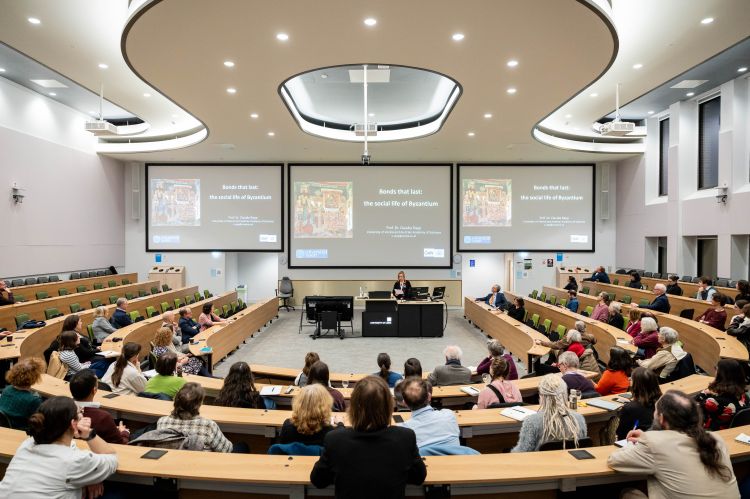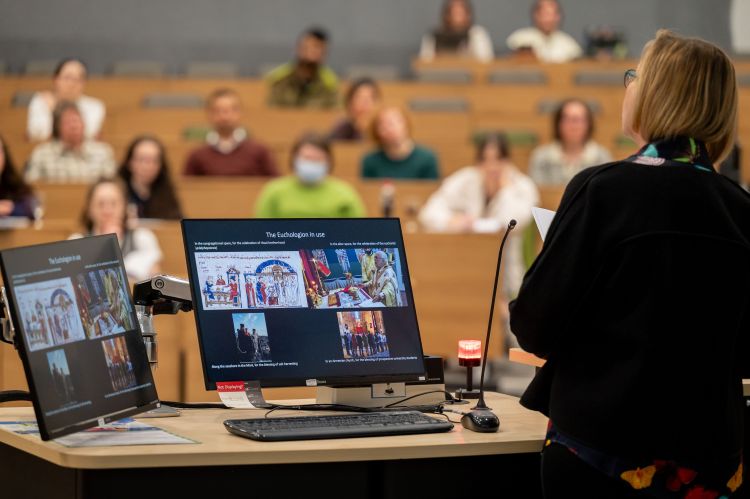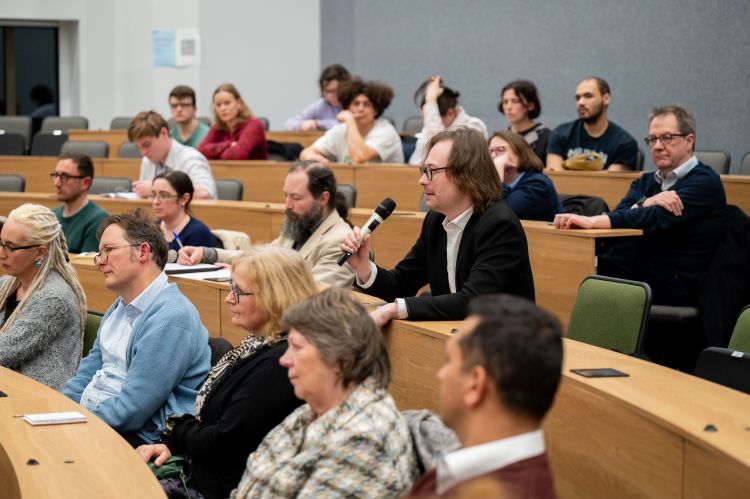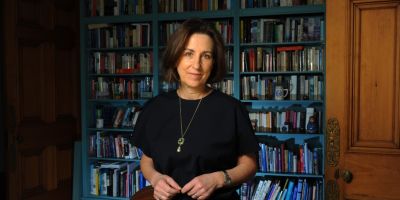World-leading Byzantinist delivers British Academy Lecture at the University of Leeds

Running since 1908, the British Academy Lecture series showcases the best new research in the humanities and social sciences
A world-leading authority in Byzantine Studies has visited the University of Leeds to deliver a prestigious British Academy Lecture on the social world of the Byzantine Empire.
Running since 1908, the British Academy Lecture series showcases the best new research in the humanities and social sciences, with distinguished scholars from the UK and beyond delivering thought-provoking lectures on a wide range of topics.

Professor Claudia Rapp delivers this year’s prestigious British Academy Lecture at the University of Leeds. Photo credit: Dustin Smith, Skywall Photography
In the lecture, Bonds That Last: The Social Life of Byzantium, which was organised by LAHRI (Leeds Arts and Humanities Research Institute) and took place at the Esther Simpson Lecture Theatre on Monday 10 March, Professor Claudia Rapp FBA drew on little-known evidence to explore how people in the Byzantine Empire navigated power, status, and social hierarchies.
Digging deep
Arguing that there is “much more to Byzantine society than the official histories convey,” Professor Rapp emphasised the need to “dig deep” and use sources that can take us beyond the traditional narratives of emperors, generals and patriarchs. These sources include, for instance, lead seals that secured documents, of which around 80,000 survive today. These seals carried the name, regional origin, title and rank of the sealer, allowing us to identify many individuals about whom traditional narrative sources may be silent. “These were often highly educated people who maintained large networks of connections through letter writing,” Professor Rapp explained.
Other useful sources include traditional archaeological evidence, such as glass, metal work, leather, ceramics and textiles, but also forms of evidence more specific to this area of study, such as euchologia – small liturgical books containing prayers that priests used to mark occasions like baptisms, weddings and funerals as well as more unusual moments like the blessing of a beehive. “We currently know of about 1,100 such manuscripts ranging from the late 8th to the mid-17th century,” Professor Rapp said. “This is completely new source material that must be studied in aggregate.”

Photo credit: Dustin Smith, Skywall Photography
Christianity as a framework for social connection
These sources, Professor Rapp demonstrated, provide evidence of a social world defined just as much by horizontal bonds as vertical ones. Contrary to what many think of as a strictly hierarchical social order, people found many ways to address their social needs within a Christian framework shaped by the church. For example, through adelphopoiesis – ‘ritual brotherhood’ – Byzantine men were able to develop meaningful one-to-one social relationships with other men, often with those who held a superior social status.
“This was not a substitute for marriage to a woman nor an impediment to it,” Professor Rapp explained, “as the men who entered it were usually married and had children. People imbued it with meaning that suited their own needs.”
On a larger scale, people forged connections with others through religious, charitable and neighbourhood groups, such as study groups for Christian writings, groups to express devotion to certain icons – such as the Holy Virgin – or groups to care for the sick.
“The only rules that regulated these groups were those they gave themselves, which invites comparison with brotherhood: a social need from the grass roots that was articulated and formulated within the framework of the church,” Professor Rapp said.

Photo credit: Skywall Photography
The lecture was followed by questions from the audience – which included academics, students and members of the public – on the textual relationships between the newly-discovered manuscripts, the dynamics of object and icon worship groups, Byzantine attitudes towards same-sex relationships, and the possible historic links and contrasts between ritual brotherhood and the earlier Greek idea of Platonic love and relationships.
Claudia Rapp FBA is Professor of Byzantine Studies at the University of Vienna and Director of the Institute for Medieval Research at the Austrian Academy of Sciences. A Fellow of the British Academy – the UK’s national academy for the humanities and social sciences – she is internationally recognised for her work on late antiquity and Byzantine society.
The British Academy Lecture is available to watch in full here.




